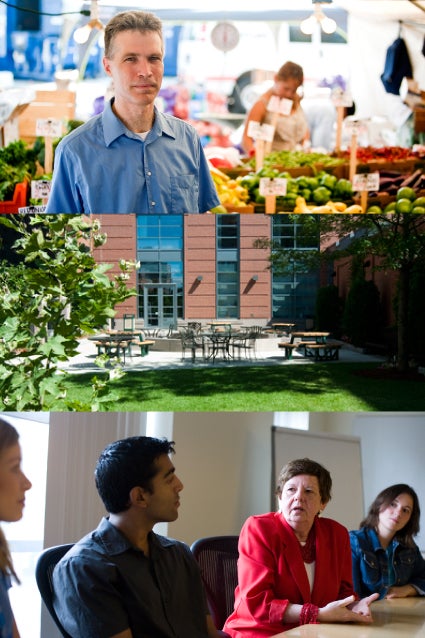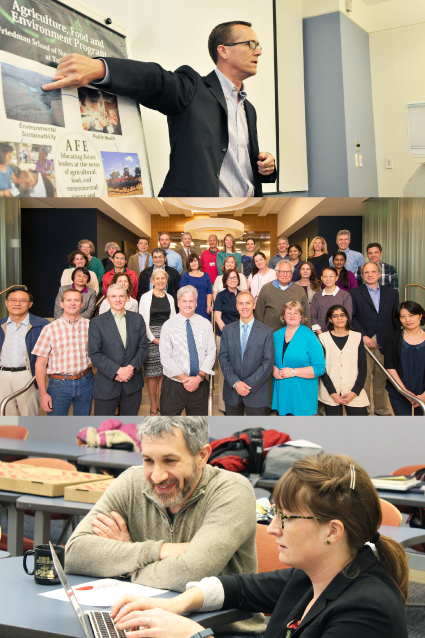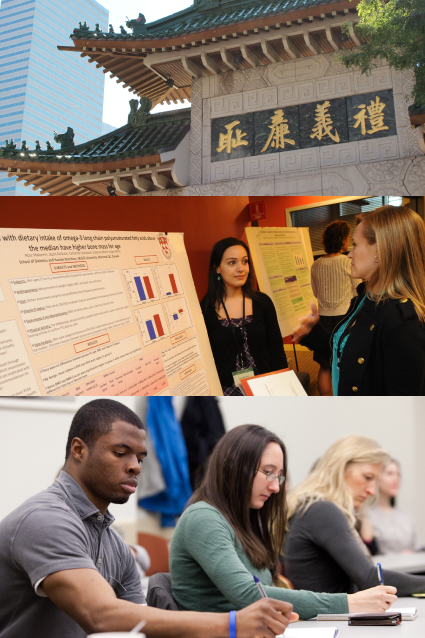Are you ready to examine and change the ecological, political, economic, and social aspects of food production and distribution? In this multi-faceted program you'll gain the skills needed to guide the next generation of food systems. With rigorous training and an exceptional intellectual community, you'll be at the forefront of generating new visions and models for sustainable systems.
Why should you come to the Agriculture, Food and Environment Program? You'll learn how to dig deep and build a more desirable food production and distribution system, making agriculture and food systems more supportive of the natural environment and the society they serve. Many students apply to the program from varied academic and professional backgrounds in areas such as agriculture, biology, nutrition or health and environmental studies, as well as political science, history, economics and business or the liberal arts. Although not required, we highly value the contributions and discussions that previous professional and volunteer experiences bring to the table.
Prerequisites
- Completed bachelor's degree
- Commitment and ability to succeed in the program through previous coursework, including at least one course in physiology, general biology or chemistry, plus optional employment and volunteer experience
- Students whose native language is not English must meet TOEFL or IELTS requirements
Master of Science
The curriculum includes core courses in nutrition science, food and environmental policy, and research skills. Each student completes a specialization (three to five courses), a field internship, and a self-designed directed study project. A total of 48 semester-hour units are required for the M.S. degree.
- To develop a breadth of understanding of agricultural science and policy issues related to soil, energy, air, water, plant breeding, plant nutrients, livestock production, pest management, and forestry
- To develop in-depth expertise on one area of AFE through specialized class work (e.g., water resources policy, local food systems, animal welfare, etc.)
- To develop sophisticated knowledge of the policymaking process
- To understand historical and current aspects of U.S. agricultural production, policy initiatives, and structures
- To develop competency in statistical methods and data analysis
- To develop basic knowledge of nutrition science
- To become a critical thinker, with advanced research, analysis, and writing skills
Doctor of Philosophy
Students enrolled in the doctoral program must have completed courses equivalent to the AFE master's degree at the Friedman School of Nutrition Science and Policy or elsewhere. Students in the doctoral program must pass a written and oral qualifying examination, and then complete and formally defend a doctoral dissertation based on original research. Learning objectives:
- To become proficient in study design, hypothesis development, and statistical analysis
- To become proficient in presentation (oral and written) and publication of research findings
- To command a sophisticated understanding of relationships connecting agriculture, food and the environment
- To become conversant in the breadth of scientific and policy knowledge related to agriculture, food, and environmental issues
For more information about the application and admissions process for the doctoral program, please click here.
Combined Degree Programs
Division Faculty

Nicole Tichenor Blackstone
Assistant Professor

Steven Block
Professor, Secondary Faculty

Sean B. Cash
Associate Professor

Kevin Cody
Adjunct Lecturer

Timothy Griffin
Associate Professor

William A. Masters
Professor

Udita Sanga
Assistant Professor

Jessica Sparks
Assistant Professor

Alexandra Thorn
Lecturer
Students wishing to view the MS or PhD degree requirement worksheet associated with their year of entry for the most accurate requirements.
Program Core
These are the required courses for the AFE program:
- Fundamentals of U.S. Agriculture (NUTR 215)
- Agricultural Science and Policy I (NUTR 233)
- Agricultural Science and Policy II (NUTR 333)
- Economics of Agriculture and the Environment (NUTR 341)
Specialization
One of the most positive aspects of AFE is the flexibility for each student to mold a specialization around the academic and professional interests that motivate ourindividual visions of sustainable food systems.
—Nyssa Schloyer (AFE '06)
Each AFE student chooses to specialize in a topic area related to future employment. Examples of topic areas include agricultural development, community development and organizing, food risk assessment, and resource economics. The specialization requires a minimum of three course credits. The professional skills course and directed study course may be among the three specialization course credits.
Nutrition Science and Policy Core
The nutrition science and policy core provides students with an understanding of basic and applied nutrition in its broadest sense, including factors affecting food production, supply, and consumption. Courses in the area reflect the school's mission of integrating science and policy related to the food supply, with particular emphasis on environmental aspects of food systems.
The following courses are required:
- Principles of Nutrition Science (NUTR 202)
- Statistical Methods in Nutrition Research I (Policy) (NUTR 207)
- Regression Analysis for Nutrition Policy (NUTR 307)
Food Policy and Programs
Each student must take at least one course in food policy, such as:
- Determinants of U.S. Food Policy (NUTR 303)
- Nutrition, Food Security, and Development (NUTR 304)
- Agriculture and Rural Development in Developing Countries (EIB E243)
Professional Skills Course
Each student must select at least one course that develops a professional skill in such areas as program monitoring and evaluation, GIS, non-profit management, epidemiology, or community organizing.
PhD Candidates Required Courses
- Survey Research in Nutrition (NUTR 210); required of PhD students only
- Nutrition Data Analysis (NUTR 311); required of PhD students only
In addition to these full courses, a standardized training in the ethical treatment of human subjects is a requirement for graduation.
The University College of Citizenship and Public Service
The University College of Citizenship and Public Service (UCCPS) is a university-wide initiative developed to make the values and skills of active citizenship a hallmark of a Tufts University education. Its mission is to ensure that students graduate from Tufts prepared to be committed public citizens and leaders who take an active role in building stronger communities and societies.
Internship Requirements
Students enrolled in the Master of Science degree program in AFE complete a minimum 400-hour internship. Depending on the student and circumstances, an internship may involve participation in the many different activities in which the organization engages or may involve completing a single project under the guidance of a staff member of the sponsoring organization. Students develop a contract detailing their educational objectives before the internship begins and present their experiences to their peers after completion.
AFE internships are a great way for students to apply core concepts, refine qualitative and quantitative skills, develop working relationships with the potential for future employment, or simply explore new aspects of the field. From Switzerland to the Nation's Capitol, Iowa's Corn Belt to Boston's urban-fringe, AFE internships provide an important platform for practical training and professional development.
With the launch of our new Ellie Block and Family Careers Services Center, our support for your career goals has never been stronger. From 24/7 access to a digital resource hub, to job listings and one-on-one appointments with alumni in the field, we've stepped up our services for every student at the school and for every alum in the field.
After leaving the AFE program, students pursue a variety of careers with social change at the core of their work. AFE graduates are found at think tanks, advocacy organizations, local, state, and federal governments, community-based NGOs, schools, and occasionally, on the farm.
Today, more than 70 AFE alumni are active in the workforce, meeting the growing demand for professionals with an integrated understanding of agricultural, food and environmental interactions.
Examples of positions held by alumni include:
Academic Institutions
- Ph.D. graduate at Unity College in Maine teaching undergraduates in the Department of Environmental Studies
- Senior Research Coordinator "Shape Up Somerville: Eat Smart, Play Hard," Tufts University
Research Organizations
- Policy analyst working on food biotechnology, Resources for the Future
- Policy analyst working on "factory farming," Worldwatch Institute
Private Industry
- Several graduates at Equal Exchange and Red Tomato, working on the sourcing and marketing of sustainable, fair trade and local foods
- Advisor on health claim labeling, Mars Corporation.
Government
- Bureau Director, Massachusetts Department of Agricultural Resources overseeing Water Quality and Pesticides program
- Consultant, Massachusetts Department of Public Health
NGOs
- Manager at The Food Project, using urban gardening to promote youth development
- Associate, Food and Agriculture Group, Business for Social Responsibility
International Development
- Consultant on water issues, The World Bank
- Rwanda country staff, Food for the Hungry International
Additionally, AFE graduates love farming...
- Board member, Waltham Community Farm
- Owner, heirloom organic flower farm







